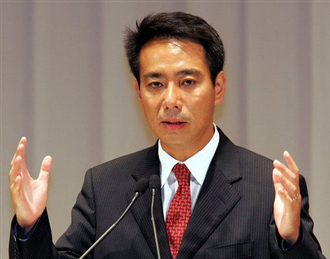Yoshihiko Noda seems like a great guy, the kind you would trust to do the heavy lifting on your team. But is he the kind of leader Japan needs to reverse its two decades of decline?
The answer to that question comes from Noda himself: “I am a loach. I can’t be a goldfish,” he told his fellow parliamentarians of the ruling Democratic Party of Japan (DPJ).
A loach is a drab, whiskered, bottomfeeding relative of the carp — popular for keeping aquariums clean. In his speech appealing to fellow DPJ lower-house lawmakers for their votes for party leadership (which is tantamount to the prime minister’s office), Noda portrayed himself as a humble, unassuming man — raised in an impoverished farming family, lacking city polish, eager not to alienate anyone.
The fact that after two rounds of voting Yoshihiko Noda, the loach, emerged as the DPJ’s choice for leader reveals the character of Japan’s political system — an oligarchy camouflaged as a parliamentary democracy imposed by constitution drafted under the U.S. Occupation.
The Japanese brand of backroom concensus politics is designed not to threaten the cozy relationship between a powerful, insular, deeply-entrenched bureaucracy and the executives atop giant corporations. The Diet insulates this true axis of Japan’s power structure from popular discontent. A key element of this insulating structure is a disposable prime minister who serves as a lightning rod for voter discontent but is never allowed to marshall the influence to bring about real change.
In fact, a truly charismatic and independently influential prime minister would be fatal to this charade of democracy by actually being able to translate the popular will into governmental policy at the possible expense of corporate interests.
Thus, Japan’s next prime minister is Noda the loach, not Seiji Maehara, the boyishly handsome, charismatic ex-foreign minister who was the choice of half of Japan’s voters, or even Banri Kaieda who enjoyed the support of embattled Ichiro Ozawa, a DPJ backroom boss who has spent the past three decades trying to bring about some real change to Japan’s broken political system. Like most leaders who threatened to produce real change, Ozawa has been sidelined by a corruption scandal — the kind that sidelined Maehara earlier this year when it appeared that he was poised to become Naoto Kan’s successor. That’s because Japan’s press is another extension of its corporations. The oligarchy that the U.S. Occupation sought to break up simply reassembled itself in a new, exceptionally hardy form.
The March 11 quake and tsunami and the nuclear crisis provided a real opportunity for the Japanese people to press their desire for a government that is more responsive to the needs of a post-industrial Japan. That opportunity has been defused again by the nation’s true masters.

